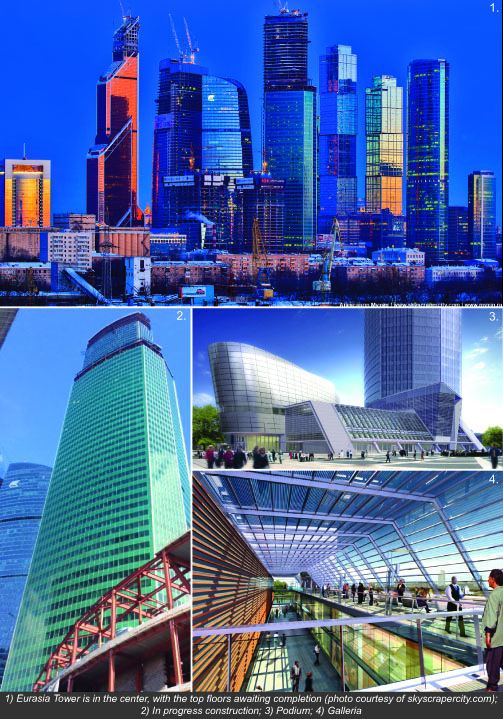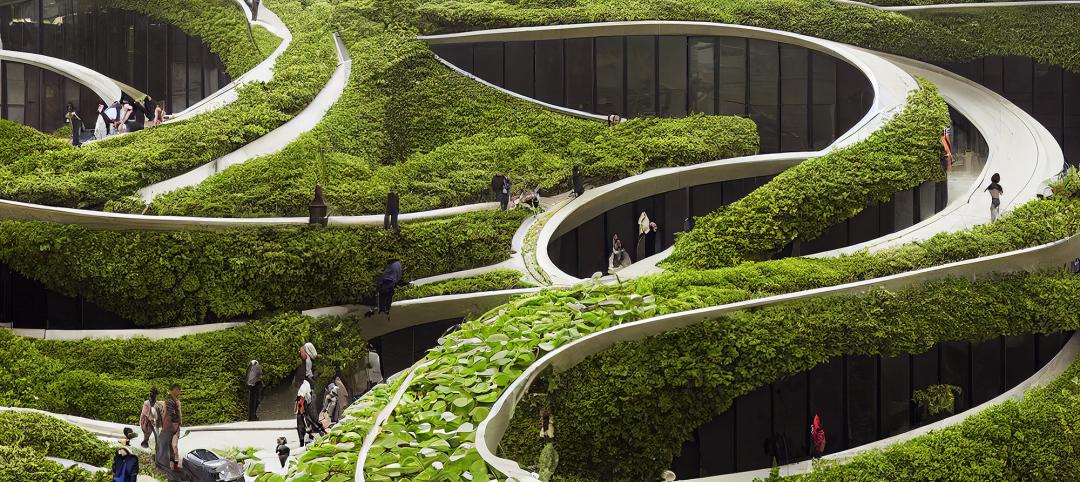This year’s completion of the 2.2 million-sf Eurasia Tower, designed by Swanke Hayden Connell Architects (Swanke), represents the successful culmination of a decade-long immersion in the development of “New Russia,” and expands the firm’s international architectural expertise to include high-rise, mixed-use design.
The 72-story tower—the first mixed-use, steel tower in Russia—is located within the new, 30 million-sf, 148-acre Moscow International Business Center (MIBC) or “Moscow City.”
The complex and the tower are based on futuristic development standards of a world class financial center and intermodal hub. Using the best of the 21st century's innovative technologies, the center intends to rival those of New York City and London and be one of the most desirable locations in Russia and Europe. It was recently designated the fourth tallest skyscraper in Europe by Emporis, the international provider of building data.
The Eurasia Tower is the second Swanke-designed building rated by Emporis, which also rated the Is Bankasi Towers Complex among the top-ten innovative and imposing designs of notable bank buildings around the world. The Is Bankasi design brought Swanke to the attention of Summa, a Turkish international contractor/developer working for Russian investors, and led to the Eurasia Tower commission in 2007.
Eurasia Tower is 1,013 feet high. Within it are 50 floors of Class A office space and 20 floors of luxury residential apartments with their own gymnasium and pool on the 50th floor. The tower sits on a retail and entertainment podium that includes boutiques, restaurants, bars, a 149-room hotel, and parking.
As one of the more refined towers in the MIBC complex and the third tallest, the architectural skin of the building reinforces the purity of the tower volume over the complexity of the program within. The unitized curtain wall allows the transition from the office floors of fixed windows to operable windows on the residential floors. The overall architectural form is developed as a pure glass, curving, curtain wall tower with its broad faces versus its tripartite ends sitting on a multi-volume podium.
The success of Eurasia Tower led directly to Swanke's re-commission last year to design a tower complex, Project Silver, in Moscow. It will be a 1,437-unit, upmarket, residential complex with three 52-story towers, on a two-story, above-grade, mixed-use podium of residential amenities, office, retail, and parking. Much attention is being given to seamlessly integrate this 3.2 million-square foot complex into the surrounding neighborhood adjacent to a public park.
Related Stories
Cultural Facilities | Aug 21, 2024
Baltimore’s National Aquarium opens 10,000-sf floating wetland that mimics the harbor’s original tidal marsh habitat
The National Aquarium in Baltimore has opened the National Aquarium Harbor Wetland, a 10,000-sf floating wetland that mimics the Inner Harbor’s original Chesapeake Bay tidal marsh habitat. Located between Piers 3 and 4 on Baltimore’s Inner Harbor, the $14 million project features more than 32,000 native shrubs and marsh grasses.
Mixed-Use | Aug 21, 2024
Adaptive reuse of a Sears store becomes luxury mixed-use housing
6 Corners Lofts at 4714 W Irving Park Road, Chicago, Ill., opened in March of 2024 as a 394,000-sf adaptive reuse project born out of a former Sears store.
Building Materials | Aug 19, 2024
Federal 'buy clean' construction materials label program unveiled
The U.S. Environmental Protection Agency announced a plan for implementing a new label program to boost American production of more climate-friendly construction materials and products. The label program will prioritize steel, glass, asphalt and concrete.
Museums | Aug 19, 2024
The Tampa Museum of Art will soon undergo a $110 million expansion
In Tampa, Fla., the Tampa Museum of Art will soon undergo a 77,904-sf Centennial Expansion project. The museum plans to reach its $110 million fundraising goal by late 2024 or early 2025 and then break ground. Designed by Weiss/Manfredi, and with construction manager The Beck Group, the expansion will redefine the museum’s surrounding site.
AEC Tech | Aug 19, 2024
Harnessing AI to revolutionize architectural design and creativity
Architects are wondering if AI will replace us. For Vessel, the gains offset the fear. We believe there is wisdom in the unattributed quote, “You won’t lose your job to AI. You will lose your job to someone using AI.”
Reconstruction & Renovation | Aug 19, 2024
Movement to protect historic buildings raises sharp criticism
While the movement to preserve historic buildings has widespread support, it also has some sharp critics with well-funded opposition groups springing up in recent years. Some opponents are linked to the Stand Together Foundation, founded and bankrolled by the Koch family’s conservative philanthropic organization, according to a column in Governing magazine.
Government Buildings | Aug 19, 2024
GSA posts new RFI for enabling energy efficiency, decarbonization in commercial buildings
The U.S. General Services Administration (GSA), in collaboration with the U.S. Department of Energy, recently released a new Request For Information (RFI) focused on enabling energy efficiency and decarbonization in commercial buildings. GSA wants to test innovative technologies through GSA’s Center for Emerging Building Technologies.
MFPRO+ New Projects | Aug 16, 2024
At 60 stories, the Paramount multifamily development will stand as Nashville’s tallest high rise
When complete, the 60-story Paramount building, at 750 feet high, will be the tallest high rise tower in Nashville, Tenn., surpassing the city’s current record holder, the 617-foot AT&T Building. The $390 million Paramount project recently launched condo sales after securing more than $230 million in construction financing.
Urban Planning | Aug 15, 2024
New York City begins first large-scale porous pavement installation
New York City is installing its first large-scale porous pavement installation along seven miles of roadway in Brooklyn. The project will keep 35 million gallons of stormwater out of the combined sewer system each year, according to a news release.
Urban Planning | Aug 15, 2024
The magic of L.A.’s Melrose Mile
Great streets are generally not initially curated or willed into being. Rather, they emerge organically from unintentional synergies of commercial, business, cultural and economic drivers. L.A.’s Melrose Avenue is a prime example.


















